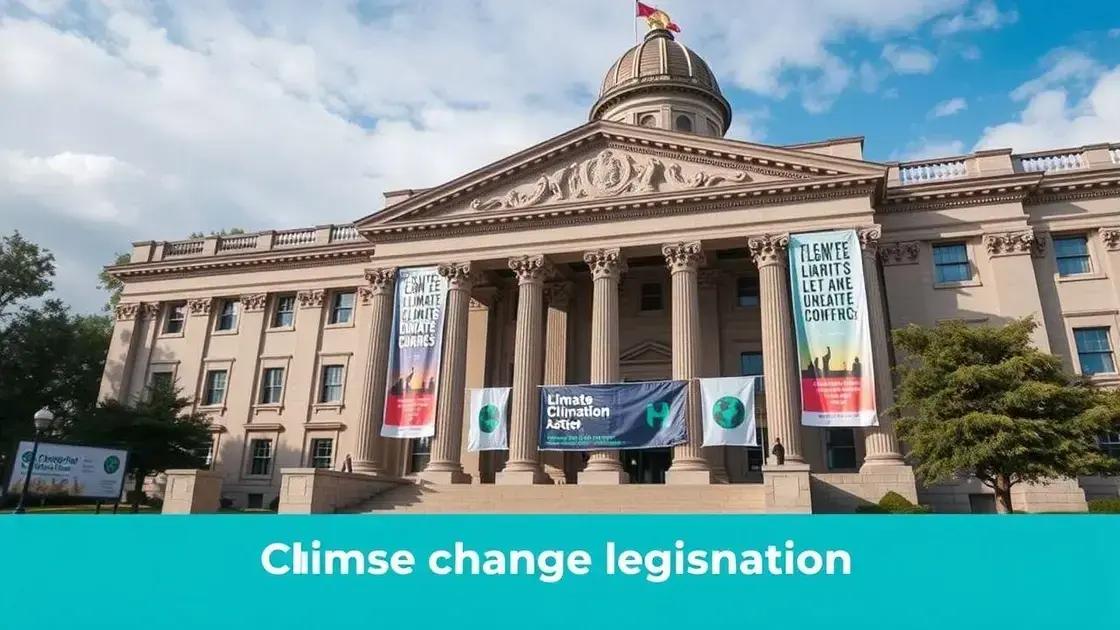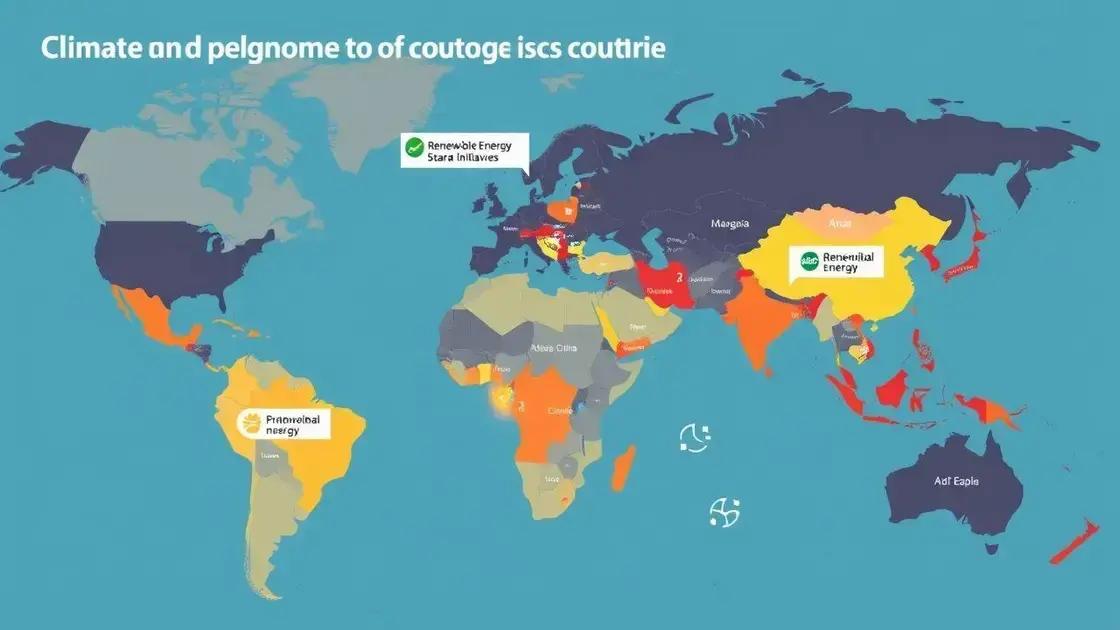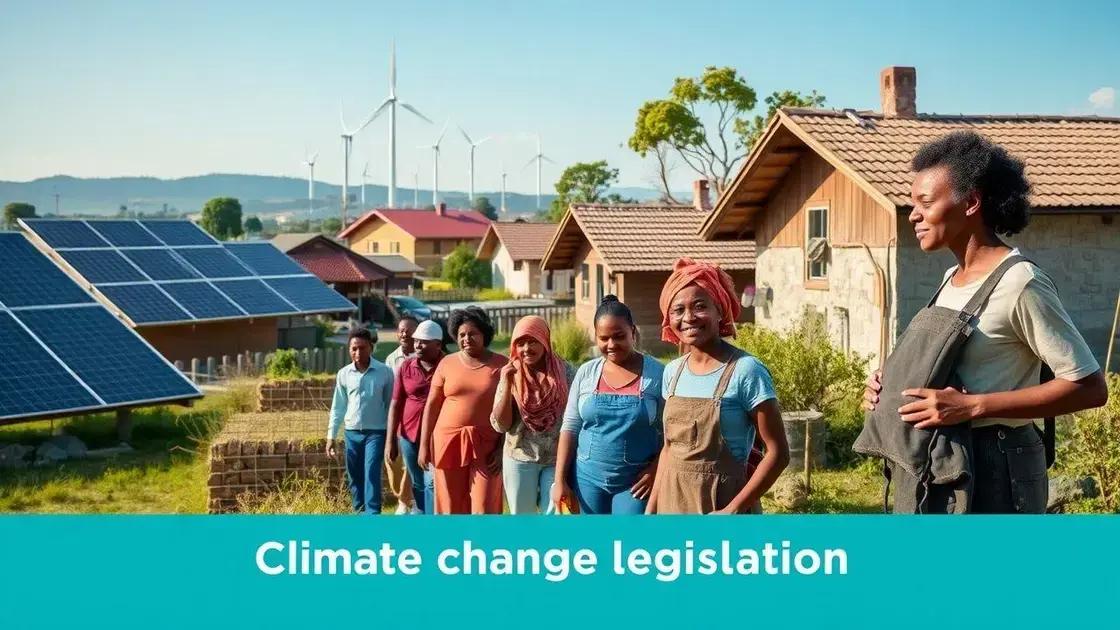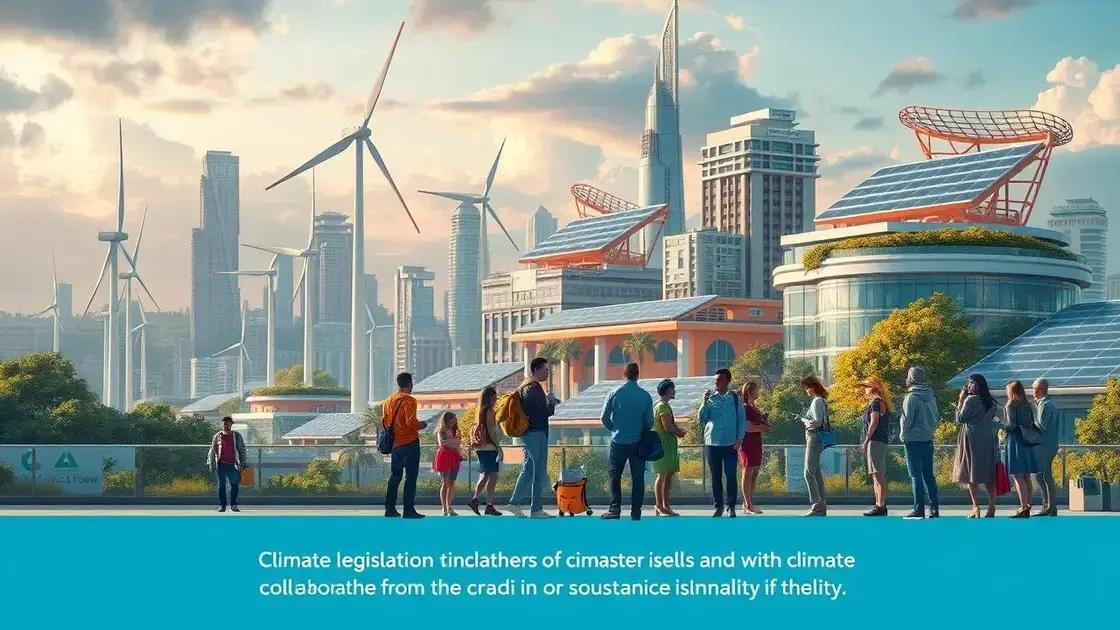Climate change legislation: what you need to know

Anúncios
Climate change legislation includes laws aimed at reducing greenhouse gas emissions, promoting renewable energy, and ensuring sustainable practices to combat climate change effectively.
Climate change legislation is becoming increasingly crucial as the world grapples with environmental challenges. Have you ever wondered how these laws directly influence your daily life and the future of our planet?
Understanding climate change legislation
Understanding climate change legislation is essential as it shapes how countries respond to the pressing environmental challenges we face. These laws are designed to limit greenhouse gas emissions, promote renewable energy, and protect ecosystems.
Anúncios
Many governments recognize that effective climate change policies can lead to significant benefits, including improved public health, job creation in green industries, and a more sustainable future. Different countries approach legislation in various ways, reflecting their unique circumstances and priorities.
Key elements of climate change legislation
Various factors influence how climate change legislation is formed. Here are some key elements:
- Emission reduction targets, which set specific goals for lowering greenhouse gases.
- Incentives for renewable energy development, encouraging businesses and individuals to use cleaner energy sources.
- Regulations on fossil fuel usage, aiming to limit dependency on non-renewable resources.
- Funding for research and innovation in sustainable technologies.
Countries worldwide are implementing specific policies to tackle climate change. For instance, many nations have introduced carbon pricing schemes to encourage businesses to reduce their emissions. This mechanism makes polluting more expensive, incentivizing organizations to seek more sustainable practices.
Anúncios
Another avenue is the establishment of renewable energy standards, which mandate a certain percentage of energy be derived from renewable sources. Such laws aid in transitioning from fossil fuels to cleaner energy.
International cooperation
Climate change is a global issue, which makes international cooperation vital. Agreements such as the Paris Agreement aim to unite countries in their commitment to combating climate change. Under this framework, nations pledge to set and meet their own emission reduction targets.
As people continue to feel the effects of climate change through extreme weather, rising sea levels, and ecological disruptions, understanding the impact of these legislative efforts is crucial. By being informed, individuals can engage with policymakers and voice their support for effective climate action.
Key policies around the globe

Key policies around the globe play a vital role in addressing climate change. These laws and initiatives are designed to reduce emissions and promote sustainability. Understanding these policies can help individuals see how different countries contribute to a healthier planet.
Many nations have adopted distinct approaches based on their unique challenges and resources. For example, the European Union has implemented strict emission trading systems that help regulate industrial emissions effectively. These policies encourage companies to invest in cleaner technologies.
Prominent examples of climate policies
Several countries stand out for their innovative policies:
- California has set ambitious greenhouse gas emission reduction targets, focusing on renewable energy expansion.
- Germany is a leader in solar energy and has enacted policies to phase out nuclear power.
- China is investing heavily in renewable technologies, particularly solar and wind, aiming to reduce coal dependency.
- New Zealand has created a framework for carbon neutrality, emphasizing sustainable land management.
These examples highlight how different strategies can lead to meaningful progress in combating climate change. While each country faces its challenges, their commitment to strong policies is vital in the global fight against climate change.
Further, international collaborations play a significant role. Many nations participate in agreements like the Paris Agreement, where they pledge to work together to meet shared climate goals. These partnerships encourage countries to share resources and innovative practices, enhancing their overall effectiveness.
As nations around the world implement these policies, citizens can stay informed and engaged. By understanding key policies, individuals can better advocate for action in their communities and support initiatives that promote a sustainable future.
The role of government in climate action
The role of government in climate action is crucial in ensuring effective measures are taken to combat climate change. Governments hold the power to enact laws, regulate industries, and allocate resources that can drive significant environmental progress.
Effective climate policies often start with legislation that sets clear goals for emission reductions. For instance, some governments establish strict emission standards for vehicles and power plants. By doing this, they encourage cleaner technologies and sustainable practices.
Government initiatives and programs
Many nations implement various initiatives to promote climate action:
- Incentives for renewable energy: Governments can provide tax credits and grants to encourage businesses and homeowners to invest in solar, wind, and other renewable energy sources.
- Public transportation development: By investing in public transit, governments can reduce reliance on fossil fuel-powered vehicles, thus cutting down on emissions.
- Research funding: Providing financial support for climate research can lead to innovations that benefit the environment and society.
- Community engagement: Governments often host events and workshops to educate the public about environmental issues and promote sustainable practices.
In addition to these initiatives, governments are responsible for enforcing environmental regulations. This means monitoring emissions and ensuring that companies comply with the laws designed to protect public health and the planet.
Collaboration is another key aspect of governmental action. Local, state, and federal agencies often work together to create comprehensive climate strategies. These coordinated efforts allow for a more robust and unified approach to climate action.
Also, many governments participate in international agreements, like the Paris Agreement, which sets global targets for emissions reductions. By taking part in these global frameworks, nations demonstrate their commitment to fighting climate change collectively.
Effects on local communities and economies

The effects of climate change legislation on local communities and economies can be substantial and varied. As governments take action against climate change, these measures can directly influence the quality of life for individuals and families.
For many communities, the implementation of climate policies can lead to job creation in green industries. Investing in renewable energy sources like solar and wind generates new employment opportunities. This shift not only supports local economies but also promotes sustainable practices that can have lasting benefits.
Positive impacts on communities
Some positive effects of climate change legislation include:
- Improved air quality: Reducing emissions from industries and vehicles can lead to cleaner air, decreasing health issues related to pollution.
- Access to renewable energy: Local communities can benefit from clean energy sources, leading to lower energy costs and increased energy independence.
- Community development: Investment in green infrastructure can revitalize neighborhoods, enhancing local amenities and attracting new businesses.
- Increased resilience: Communities that adopt climate policies often become more resilient to extreme weather events, protecting lives and property.
While the benefits are significant, there are also challenges posed by climate change legislation. Some regions that rely heavily on fossil fuels may face economic downturns as they transition to greener practices. This might lead to job losses in traditional industries, requiring communities to adapt and find new opportunities. Training programs can help workers transition into sustainable job sectors.
The economic impact of climate policies can vary widely, with some communities benefiting more than others. Urban areas may have advantages in renewable infrastructure, while rural communities might struggle without adequate resources and support. It’s essential for governments to consider the diverse needs of different regions when implementing climate legislation.
Ultimately, the effects of climate change legislation on local communities and economies highlight the importance of a balanced approach. Ensuring that transition strategies are inclusive and equitable can create a more sustainable future for all.
Non-governmental organizations and their impact
Non-governmental organizations (NGOs) play a significant role in addressing climate change and influencing legislation. They often serve as advocates for environmental protection and sustainability, pressuring governments and businesses to adopt more responsible practices.
Many NGOs focus on raising awareness about the effects of climate change and the importance of strong legislation. Through campaigns and educational programs, these organizations inform the public about environmental issues and encourage individuals to take action.
Key contributions of NGOs
NGOs contribute in several important ways:
- Advocacy: They lobby for stronger climate policies at local, national, and international levels, pushing for effective laws to reduce emissions.
- Research and data collection: NGOs often conduct research to provide valuable information on the impacts of climate change and the effectiveness of existing policies.
- Community support: Many organizations work directly with communities to implement sustainable practices and promote green technologies.
- Partnerships: NGOs collaborate with governments, businesses, and other organizations to create initiatives that benefit the environment and society.
Through their efforts, NGOs have been instrumental in promoting renewable energy, protecting natural habitats, and advocating for marginalized communities affected by climate change. They often highlight the voices of those who may be overlooked in the political process, ensuring that various perspectives are included in the discussion.
NGOs also engage in international dialogues, attending climate conferences and negotiations. Their presence amplifies the urgency of climate action and encourages countries to commit to ambitious targets. These organizations act as watchdogs, holding governments accountable for their climate promises and ensuring that they fulfill their obligations.
As climate change continues to pose significant challenges, the work of non-governmental organizations remains essential. Their advocacy, research, and community outreach efforts contribute to shaping a more sustainable future and driving meaningful change globally.
Future trends in climate legislation

Future trends in climate legislation will shape how we address climate change in the coming years. As awareness grows about the impacts of climate change, we can expect more comprehensive and ambitious policies from governments worldwide.
One emerging trend is the increased focus on carbon neutrality. Countries are setting bold targets to achieve net-zero emissions by a specific year, often aiming for 2050 or earlier. This signifies a commitment to reduce greenhouse gas emissions across all sectors, from transportation to agriculture.
Innovative policy measures
New and innovative policy measures are gaining traction:
- Carbon pricing: Implementing carbon taxes or cap-and-trade systems can incentivize companies to reduce emissions by making it financially beneficial.
- Green finance: There’s a growing emphasis on funding sustainable projects through green bonds and investment in renewable energy technologies.
- Regulatory frameworks: More countries are introducing strict regulations on emissions to hold companies accountable for pollution.
- Incorporation of climate data: Utilizing scientific data to inform policy decisions ensures a more effective response to climate challenges.
Additionally, the role of environmental justice is becoming increasingly important. Future legislation is likely to focus on ensuring that marginalized communities are not disproportionately affected by climate policies. This can include providing support for vulnerable populations and addressing inequalities in environmental impacts.
Another trend is the rise of international collaboration. Agreements like the Paris Agreement highlight the need for countries to work together towards shared goals. Future climate legislation may involve even stronger commitments to international treaties, promoting accountability and cooperation between nations.
As technology continues to innovate, we can also expect legislation to adapt. Policies will likely evolve to incorporate advancements in renewable energy, energy efficiency, and sustainable practices.
FAQ – Frequently Asked Questions about Climate Change Legislation
What is climate change legislation?
Climate change legislation refers to laws and regulations aimed at reducing greenhouse gas emissions and promoting sustainability.
How do non-governmental organizations contribute to climate action?
NGOs advocate for stronger climate policies, conduct research, and engage communities to raise awareness about climate change.
What are the key trends in future climate policies?
Future trends include a focus on carbon neutrality, innovative policy measures like carbon pricing, and increased international cooperation.
How can individuals support climate change initiatives?
Individuals can support climate change initiatives by advocating for sustainable practices, participating in community programs, and reducing their own carbon footprint.







